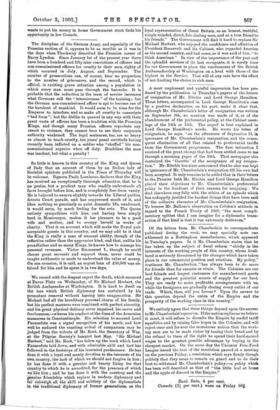A most unpleasant and painful impression has been pro- duced
by the publication in Thursday's papers of the letters of resignation of Mr. Ritchie and Lord George Hamilton. These letters, accompanied in Lord George Hamilton's case by a positive declaration on his part, make it clear that, although Mr. Chamberlain's letter of resignation was written on September 9th, no mention was made of it, or of the abandonment of the preferential policy, at the Cabinet meet- ings of the 14th or 15th. The sequel is best explained in Lord George Hamilton's words. He wrote his letter of resignation, he says, "on the afternoon of September 15, in ignorance of Mr. Chamberlain's resignation, and the conse- quent elimination of all that related to preferential tariffs from the Government programme. The first intimation I received of the great change that had been settled came to me through a morning paper of the 18th. That newspaper also contained the ' Gazette ' of the acceptance of my resigna- tion." Mr. Ritchie has since announced that he also was kept in ignorance of Mr. Chamberlain's resignation till his own had been accepted. It only remains to be added that in their letters to the Premier both Mr. Ritchie and Lord George Hamilton placed their objections to Mr. Chamberlain's preferential policy in the forefront of their reasons for resigning. We deal elsewhere very fully with the ethics of an episode which has unhappily justified the hardest things that have been said of the collusive character of Mr. Chamberlain's resignation. To borrow Mr. Balfour's observation on Cobden's attitude in regard to the French Treaty of 1860, "the most compli- mentary epithet that I can imagine for a diplomatic trans- action of that kind is that it was extremely dexterous."


























































 Previous page
Previous page